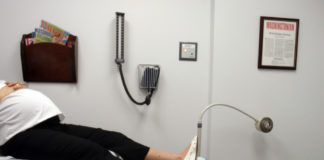Tag: Pregnancy
Exposure to Antidepressants in the Womb Makes for Sad, Scared Adolescents
SSRI exposure in utero “alters the offspring’s brain structure,” causing a hyperactive amygdala and fear circuits, leading to anxiety and depression.
Animal Study: SSRI Neurotoxic in Pregnancy
Researchers: Fetal exposure to vilazodone hampers neurodevelopment and leads to "long-lasting neurodevelopmental impairments."
Study Finds No Increased Risks for Pregnant Women Who Discontinue SSRIs/SNRIs
A new article published in Pharmacy and Clinical Pharmacology finds pregnant women that chose to stop using selective serotonin reuptake inhibitors (SSRIs) and serotonin...
Antiseizure Drug Exposure in Pregnancy Linked to Large Risk of Autism,...
Harms are “largely overlooked by psychiatry despite widespread usage,” according to the researchers.
Antidepressant Exposure In Utero May Negatively Impact Motor Skills in 2-Year-Old...
A new study in Frontiers of Pharmacology finds that antidepressant use during pregnancy is linked to reduced motor skills in children at 2 years...
Animal Study Shows Impact of Prozac in Pregnancy on the Child
Researchers found that rats born to mothers given the antidepressant Prozac during pregnancy or breastfeeding exhibited varied behavioral and developmental effects, with implications for the understanding of antidepressant impacts during human pregnancies.
Chemicals Have Consequences—Antidepressants and Pregnancy: An Interview With Adam Urato, MD
Adam joins us to discuss what we do and don’t know about the effects of antidepressants on babies and mothers and the importance of counselling in order to aid families in making important decisions about pharmaceutical drug use.
Depression in Pregnancy May Alter Babies’ Brains
From Medscape: "Women with depression and anxiety during pregnancy may be more likely to have babies with altered brain development that might be linked...
Schizophrenia ‘Risk Genes’: Not So Risky if Mother’s Pregnancy Healthy
From STAT news: "Far be it from us to tell 23andMe how to run its business, but if it or any other DNA company wants to...
How Compassion Can Triumph Over Toxic Childhood Trauma
From Medical Xpress: New research findings suggest that when pregnant women who have experienced adverse childhood experiences (ACEs) feel supported by those around them, their...
CDC Reports Increased Psychostimulant Prescriptions in Women of Reproductive Age
Psychostimulant prescriptions have increased by 344% (from 2003 to 2015) for women of reproductive age (15-44 years old).
Antidepressants During Pregnancy Increase Risk of Psychiatric Diagnosis in Children
New research, based on data from almost a million children in Denmark, suggests that children of mothers who use antidepressants during pregnancy are more likely to be diagnosed with autism and psychiatric disorders.
Too Many Opioids After Cesarean Delivery
From The New York Times: A new study shows that doctors may be overprescribing opioid pain medication to women who have had cesarean sections.
Article →
Antidepressant use During Pregnancy may Increase Risk of Birth Defects
Use of antidepressants increased the risk of organ-specific malformations in women with depression
Prescribing Antidepressants for Girls: Intergenerational Adverse Consequences
Children exposed to SSRIs during pregnancy, a recent study shows, were diagnosed with depression by age 14 at more than four times the rate of children whose mothers were diagnosed with a psychiatric disorder but did not take the medication. Such reports are usually met, appropriately, with an outpouring of reassurances from clinicians who take care of pregnant women, who need to protect their emotional wellbeing in whatever way they can. From my perspective as a pediatrician specializing in early childhood mental health our attention must be on prevention.
SSRI Antidepressants Increase Surgery Risks
There is accumulating evidence that taking SSRI antidepressants increases the risk of bleeding and other complications during surgery, according to a review published in the British Journal of Anaesthesia.
Infants Exposed to Psychotropic Drugs During Pregnancy At Risk
New research published in the July issue of The Journal of Clinical Psychiatry found that the use of mood stabilizers, antipsychotics, antidepressants, and hypnotics during pregnancy is associated with increased health risks to the infant.
Chemicals Have Consequences: Antidepressants, Pregnancy, and the New York Times
Depressed pregnant women need good care. They should not be made to feel guilty for the choices they make concerning their depression or lectured to by those who don’t understand the area or lack compassion for them. In that sense, Andrew Solomon does the public a service by turning his attention and writing talents to the topic of depression and pregnancy this week in the New York Times. However, a crucial part of providing good care to depressed pregnant women is to give them accurate information on the topic. In this sense, Andrew Solomon falls short.























